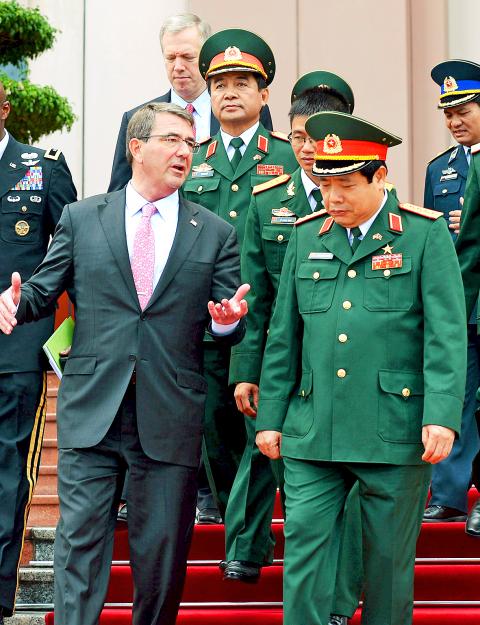A Vietnamese military band yesterday performed a rousing Star Spangled Banner as US Secretary of Defense Ashton Carter arrived for talks at the Ministry of Defense in Hanoi.
Once inconceivable, such displays between the wartime adversaries are increasingly common as Vietnam frets over China.
Carter and his counterpart, Vietnamese Minister of Defense Phung Quang Thanh, later signed a “joint vision statement” pledging to expand defense trade — including possible coproduction — and collaborate on maritime security.

Photo: Reuters
“We are both committed to deepening our defense relationship,” Carter said. “We had a very in-depth discussion that extended well over an hour-and-a-half because there is so much we are doing together.”
Carter’s Vietnam stop, midway through a 10-day Asian swing, was a signal to China that its South China Sea island-building campaign is alienating its neighbors. However, the first visit to Hanoi by a US defense secretary since 2012 was also a reminder of the limits of the burgeoning US-Vietnam relationship.
The new vision statement, which builds on an accord from 2011, is not legally binding. New US arms sales have been slow to develop since the administration of US President Barack Obama last fall partially lifted a long-standing ban on military sales to Vietnam. Hanoi has reportedly been baffled by Pentagon procedures.
In Washington, expanded arms sales are opposed by Human Rights Watch, which said Vietnam’s rights record “remains weak in all key areas.”
Some older members of the Vietnamese politburo, who recall the US as the enemy, are skeptical of a complete turnabout, and while Vietnam is wary of Chinese domination, China remains its top trading partner and an important source of capital.
“This is a piece of complex systems engineering,” said Dean Cheng (成斌), an Asian affairs specialist at the Heritage Foundation in Washington. “There are many, many moving parts, not just China and the US. The whole area is very much in flux.”
With 42 percent of Vietnamese no more than 24 years old, wartime memories are overshadowed by contemporary worries about China.
Still, Vietnam’s US$90 billion in two-way trade with China is more than double its annual cross-border commerce with the US, and more than 10 percent of foreign investment in Vietnam comes from Chinese companies.

AIR SUPPORT: The Ministry of National Defense thanked the US for the delivery, adding that it was an indicator of the White House’s commitment to the Taiwan Relations Act Deputy Minister of National Defense Po Horng-huei (柏鴻輝) and Representative to the US Alexander Yui on Friday attended a delivery ceremony for the first of Taiwan’s long-awaited 66 F-16C/D Block 70 jets at a Lockheed Martin Corp factory in Greenville, South Carolina. “We are so proud to be the global home of the F-16 and to support Taiwan’s air defense capabilities,” US Representative William Timmons wrote on X, alongside a photograph of Taiwanese and US officials at the event. The F-16C/D Block 70 jets Taiwan ordered have the same capabilities as aircraft that had been upgraded to F-16Vs. The batch of Lockheed Martin

US President Donald Trump yesterday announced sweeping "reciprocal tariffs" on US trading partners, including a 32 percent tax on goods from Taiwan that is set to take effect on Wednesday. At a Rose Garden event, Trump declared a 10 percent baseline tax on imports from all countries, with the White House saying it would take effect on Saturday. Countries with larger trade surpluses with the US would face higher duties beginning on Wednesday, including Taiwan (32 percent), China (34 percent), Japan (24 percent), South Korea (25 percent), Vietnam (46 percent) and Thailand (36 percent). Canada and Mexico, the two largest US trading

GRIDLOCK: The National Fire Agency’s Special Search and Rescue team is on standby to travel to the countries to help out with the rescue effort A powerful earthquake rocked Myanmar and neighboring Thailand yesterday, killing at least three people in Bangkok and burying dozens when a high-rise building under construction collapsed. Footage shared on social media from Myanmar’s second-largest city showed widespread destruction, raising fears that many were trapped under the rubble or killed. The magnitude 7.7 earthquake, with an epicenter near Mandalay in Myanmar, struck at midday and was followed by a strong magnitude 6.4 aftershock. The extent of death, injury and destruction — especially in Myanmar, which is embroiled in a civil war and where information is tightly controlled at the best of times —

China's military today said it began joint army, navy and rocket force exercises around Taiwan to "serve as a stern warning and powerful deterrent against Taiwanese independence," calling President William Lai (賴清德) a "parasite." The exercises come after Lai called Beijing a "foreign hostile force" last month. More than 10 Chinese military ships approached close to Taiwan's 24 nautical mile (44.4km) contiguous zone this morning and Taiwan sent its own warships to respond, two senior Taiwanese officials said. Taiwan has not yet detected any live fire by the Chinese military so far, one of the officials said. The drills took place after US Secretary